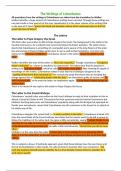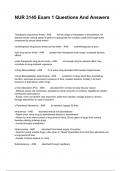NCA -> National Credit Act
Theme 5: Credit Agreements
Chapter 12
Introduction
• Credit enables consumers who cannot, or choose not, pay in cash for products
or services, to have the use of such product or service prior to their having paid
for it
• As a result, many contracts are concluded on a daily basis whereby money is
borrowed, goods are purchased or hired, or services are obtained in instalments
• These contracts may easily be misused in order to exploit the consumer – maidly
as a result of the unequal bargaining power between the consumer and credit
grantor
• The National Credit Act 34 of 2005 was assented to on 10 March 2006
• The Act came into operation in piece-meal fashion and repealed the Credit
Agreements Act and the Usury Act
• It addresses the contractual and financial aspects of the agreements to which it
applies
• Contracts for the purchase of land on instalments are still primarily regulated by
the Alienation of Land Act
Parties:
• The parties in respect of a credit agreement to which the Act applies, are known
as the credit provider and the consumer
• The credit provider is the party who supplies goods or services, advances
money, etc.
• The consumer is the party to whom the goods or services are sold, to whom
money is paid
Field of application of the NCA
Defined transactions:
• The Act applies to basically every credit agreement between parties dealing at
arm’s length and made within, or having an effect within, the Republic
, • An agreement constitutes a credit agreement to which the Act applies if it
qualifies as a credit facility, credit transaction, credit guarantee or a combination
thereof
• An agreement constitutes a credit facility if a credit provider undertakes:
a. To supply goods or services or to pay an amount or amounts to a consumer;
and
b. To either
I. Defer payment of the cost (or part thereof) of such goods or services or
to defer repayment of any part of such amount; or
II. Bill the consumer periodically for any part of such costs or amount; and
Any charge, fee, or interest to the credit provider in respect of such agreement,
deferred payment or amount billed and not paid within the time provided in the
agreement
• (examples are NB) It is important to take note of the fact that credit facilities
entail revolving credit. This means that payment affected by the consumer create
new credit. The definition of a credit facility, therefore, first of all provides for
contracts of purchase and sale of movable goods on revolving credit (an
undertaking to supply goods). Buying goods on credit by means of an in-store
card is an example. The difference between a credit facility (as a contract of
purchase and sale of movable goods) and an instalment agreement that is also a
contract of purchase and sale of movable goods lies in the transfer of ownership.
The definition of an instalment agreement requires the agreement between the
parties to address the issue of transfer of ownership. The definition of a credit
facility does not have a similar requirement. Therefore, should a contract of
purchase and sale of movable goods in the form of a credit facility not address
the transfer of ownership, the common-law rules regarding the transfer of
ownership would apply, meaning that the consumer will become the owner of the
goods immediately upon the delivery thereof to the consumer. Another difference
between credit facilities and instalment agreements is that the latter entails fixed-
sum credit. That means payment affected by the consumer do not create new
credit
• Credit facilities also include the rendering of services on revolving credit. The
definition finally provides for revolving credit money lending contracts (an
undertaking to pay an amount or amounts to the consumer). All transactions in
terms of which money is borrowed by means of a credit card, serve as an
example
• The following agreements, constitute credit transactions:
a. Pawn transactions. These are agreements in terms of which a party advances
money or grants credit to another, and takes possession of goods as security
for the money advanced or credit granted. Either the estimated resale value of
the goods exceeds the value of the money advanced, or credit granted, or a
charge, fee or interest is imposed. On expiry of a defined period the party who
took possession of the goods as security is entitled to sell the goods and
2
Theme 5: Credit Agreements
Chapter 12
Introduction
• Credit enables consumers who cannot, or choose not, pay in cash for products
or services, to have the use of such product or service prior to their having paid
for it
• As a result, many contracts are concluded on a daily basis whereby money is
borrowed, goods are purchased or hired, or services are obtained in instalments
• These contracts may easily be misused in order to exploit the consumer – maidly
as a result of the unequal bargaining power between the consumer and credit
grantor
• The National Credit Act 34 of 2005 was assented to on 10 March 2006
• The Act came into operation in piece-meal fashion and repealed the Credit
Agreements Act and the Usury Act
• It addresses the contractual and financial aspects of the agreements to which it
applies
• Contracts for the purchase of land on instalments are still primarily regulated by
the Alienation of Land Act
Parties:
• The parties in respect of a credit agreement to which the Act applies, are known
as the credit provider and the consumer
• The credit provider is the party who supplies goods or services, advances
money, etc.
• The consumer is the party to whom the goods or services are sold, to whom
money is paid
Field of application of the NCA
Defined transactions:
• The Act applies to basically every credit agreement between parties dealing at
arm’s length and made within, or having an effect within, the Republic
, • An agreement constitutes a credit agreement to which the Act applies if it
qualifies as a credit facility, credit transaction, credit guarantee or a combination
thereof
• An agreement constitutes a credit facility if a credit provider undertakes:
a. To supply goods or services or to pay an amount or amounts to a consumer;
and
b. To either
I. Defer payment of the cost (or part thereof) of such goods or services or
to defer repayment of any part of such amount; or
II. Bill the consumer periodically for any part of such costs or amount; and
Any charge, fee, or interest to the credit provider in respect of such agreement,
deferred payment or amount billed and not paid within the time provided in the
agreement
• (examples are NB) It is important to take note of the fact that credit facilities
entail revolving credit. This means that payment affected by the consumer create
new credit. The definition of a credit facility, therefore, first of all provides for
contracts of purchase and sale of movable goods on revolving credit (an
undertaking to supply goods). Buying goods on credit by means of an in-store
card is an example. The difference between a credit facility (as a contract of
purchase and sale of movable goods) and an instalment agreement that is also a
contract of purchase and sale of movable goods lies in the transfer of ownership.
The definition of an instalment agreement requires the agreement between the
parties to address the issue of transfer of ownership. The definition of a credit
facility does not have a similar requirement. Therefore, should a contract of
purchase and sale of movable goods in the form of a credit facility not address
the transfer of ownership, the common-law rules regarding the transfer of
ownership would apply, meaning that the consumer will become the owner of the
goods immediately upon the delivery thereof to the consumer. Another difference
between credit facilities and instalment agreements is that the latter entails fixed-
sum credit. That means payment affected by the consumer do not create new
credit
• Credit facilities also include the rendering of services on revolving credit. The
definition finally provides for revolving credit money lending contracts (an
undertaking to pay an amount or amounts to the consumer). All transactions in
terms of which money is borrowed by means of a credit card, serve as an
example
• The following agreements, constitute credit transactions:
a. Pawn transactions. These are agreements in terms of which a party advances
money or grants credit to another, and takes possession of goods as security
for the money advanced or credit granted. Either the estimated resale value of
the goods exceeds the value of the money advanced, or credit granted, or a
charge, fee or interest is imposed. On expiry of a defined period the party who
took possession of the goods as security is entitled to sell the goods and
2




